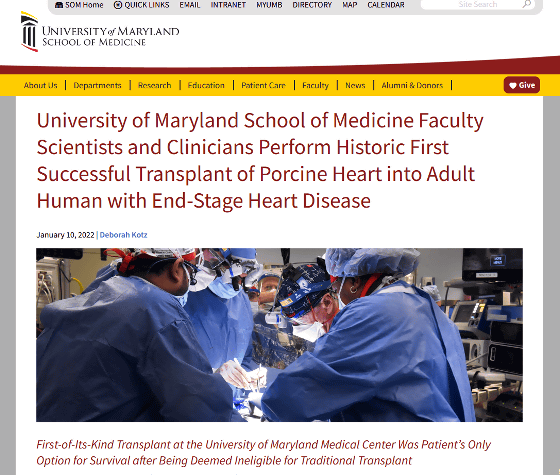Surgery to transplant the world's first ``pig heart'' to humans

In recent years, attempts to transplant animal organs to humans have been attracting attention as a means of solving the problem of donor shortages in organ transplantation, and in September 2021, an ``
2022 News - University of Maryland School of Medicine Faculty Scientists and Clinicians Perform Historic First Successful Transplant of Porcine Heart into Adult Human with End-Stage Heart Disease | University of Maryland School of Medicine
https://www.medschool.umaryland.edu/news/2022/University-of-Maryland-School-of-Medicine-Faculty-Scientists-and-Clinicians-Perform-Historic-First-Successful-Transplant-of-Porcine- Heart-into-Adult-Human-with-End-Stage-Heart-Disease.html

Maryland doctors transplant pig's heart into human patient in medical first | Maryland |
https://www.theguardian.com/us-news/2022/jan/10/maryland-pig-heart-transplant-human-medical-first
Surgeons Implant Pig Heart Into Human Patient in World-First Case
https://www.sciencealert.com/us-surgeons-successfully-implant-pig-heart-into-a-human-with-end-stage-heart-disease
The University of Maryland Medical Center announced on January 10, 2022 that it had transplanted a ``genetically modified pig heart'' into a human patient. Surgery was performed on January 7, and the patient is still alive at least 3 days after surgery. The results show that the hearts of genetically engineered animals are not immediately rejected by the human body and continue to function, the medical team said, but the success of the surgery remains to be determined. is premature.
The world's first pig heart transplant was performed by 57-year-old David Bennett of Maryland. Mr. Bennett is not eligible for transplant surgery using a human heart due to problems such as severe heart failure and arrhythmia, and has been bedridden for the past few months connected to a life support device. On December 31, 2021, the U.S. Food and Drug Administration (FDA) gave Mr. Bennett emergency approval for surgery to transplant a pig's heart.
Since there is no hope of a human heart being transplanted, this was the only way for Bennett to survive, even though there was no guarantee that a pig heart transplant would be successful. The day before the surgery, Bennett said, 'Either you die or you do this transplant. I want to live. I knew this surgery was a gamble, but this is my life.' It's my last choice,' he said. 'I look forward to getting out of bed after my recovery.'
You can see the state of the world's first 'surgery to transplant pig hearts to humans' in the following movie. In addition to the appearance of the heart of the transplanted pig in the movie, it also contains Mr. Bennett's blood and the heart of the pig transplanted in the body, so please be careful when watching.
First Ever Pig to Human Heart Transplant (Official Video)-University of Maryland Medicine-YouTube
A genetically modified porcine heart for human organ transplantation was brought into the operating room in a container for preserving the transplant heart. Pig tissue cells have a gene that produces a sugar molecule called α-gal , and the human body recognizes α-gal as a foreign substance and attacks it, so when pig organs are transplanted into humans, acute rejection occurs. I wake up. However, the `` GalSafe pig '' developed by Revivicor, an American regenerative medicine company, is genetically modified to not contain α-gal, which prevents acute rejection when transplanted into the human body. . The kidney used in the ``surgery to connect the pig kidney to the body of a brain-dead patient'' in September 2021 was also taken from the ``GalSafe pig'' developed by Revvicor.

Surgeon Dr. Bartley Griffiths vows that the pig's heart for the transplant 'looks perfect.' In addition, Dr. Griffith is a person who has performed about 50 times 'surgery to transplant pig's heart to baboon' in the past five years.

The image below is the heart of the pig that will be transplanted to Mr. Bennett. Click or tap the image to remove the mosaic, but please be careful when viewing.

The medical team said that they used a new drug developed by Kiniksa Pharmaceuticals along with conventional anti-rejection drugs to prevent rejection when pig hearts were transplanted. The operation lasted 7 hours.

Despite the pig heart transplant, Bennett's body did not experience acute rejection, and as of January 10, he was breathing on his own, the medical team said. The next few weeks will be critical as we monitor how the transplanted heart is performing in Bennett's body as he recovers from surgery. Dr. Griffiths said, 'We are learning a lot with Mr. Bennett every day. So far, we are happy with our decision to move forward. Same with him, who had a big smile on his face. Let's go,' he said.
It is said that there are about 110,000 people waiting for organ transplants in the United States, but the number of donors who provide organs is insufficient, and as many as 6,000 patients die each year before receiving an organ transplant. It is said that there is. Therefore, xenogeneic organ transplantation is a promising means of resolving the shortage of donors, but the human body's rejection of animal organs has been an issue. ``If this works, we will be able to provide an infinite supply of organs to suffering patients,'' said Dr. Muhammad Mohiuddin, director of the University of Maryland's xenogeneic heart transplant program. showed the view that it will greatly advance medical care.
Dr. Robert Montgomery of NYU Langone Health, who underwent surgery to transplant pig kidneys into humans in September 2021, said, 'This is a truly amazing breakthrough.' 'I am thrilled as a recipient and this news gives hope to my family and other patients who will be helped by this breakthrough technology.'
In addition, an artificial heart valve (biological valve) made from porcine tissue has already been put into practical use, and Mr. Bennett said that he had received a biological valve transplant operation about 10 years ago. Mr. Bennett's son said, 'My father recognizes the magnitude and importance of what has been done,' and said that they do not know what will happen to them about the future.
・Continued
A man who was transplanted with the world's first ``pig heart'' died two months later-GIGAZINE

Related Posts:






